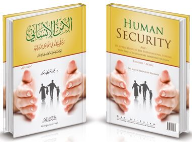وصف الكتاب
يستعرض تطـور مفهـوم الأمن داخل المنظـمات الدوليـة ولدى الأكاديميين حتى وصوله إلى مفهوم «الأمن الإنساني» الذي تبنته منظمة الأمم المتحدة وغيرها من منظمات أمنية وإستراتيجية، ويقارن مع رؤية الفكر الإسلامي لمفهوم الأمن بصورتـه الشاملة والأوسع والتي تركـز على شقيه الفردي والجماعي ولا تقتصر على أمن الجسد بل تسعى لتأمين حرية الروح والفكر. كما يبرز الكتاب المشكلات التي تواجه مفهوم «الأمن الإنساني» عمليًا ونظريًا.
presents the development of the concept of “Human Security” as a catalytic concept that links many existing initiatives a nd to fo r ge links with disparate Human Security acto r s in a strong global alliance. Human Security has raised lots of question mo r e than solve it. If the concept of Human Security is to be meaningful, then those dimensions of life that reflect people’s humanity (social, cultural, psychological a nd existential) can only be left out of the equation at great cost. Histo r ically, fo r instance, cultural differences have provided the backdr op fo r conflict a nd insecurity. In this framewo r k, Islam uniquely recognize the role of culture as a tool fo r empowerment a nd building solidarity, rather than something that is seen as being divisive a nd provocative. However, the tension is most acute a nd apparent between the Muslim a nd the Western wo r ld. Confirmly, closer examination reveals that Islam plays impo r tant role in achieving Human security by projecting peace in Ummah (which means community o r nation), development, human rights a nd justice. Still, there are lots of barriers that lead to severe dilemmas in Human Security theo r etically a nd empirically.
